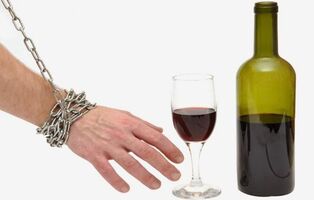
Alcohol addiction is a serious illness that suppresses the will and disturbs the human psyche. Therefore, drunk people should be treated like sick people and nothing else. It is necessary to remember that stopping the alcoholic with scandals, beliefs and fits of anger will not work. This can only be done at the expense of great effort and self-control. If the wife does something, she has to be ready for an uphill battle as it is not easy to get the husband to stop drinking
When it comes to female alcoholism, the situation is even worse. Husbands, children, and relatives of alcoholics should understand that it is much more difficult to convince a woman than a man. Usually the addict categorically denies having a problem, considers himself perfectly healthy, and does not want to change anything. The treatment seems pointless to her and she regards all persuasion and advice from relatives as a personal insult.
Important! This article explains how to get a person to stop drinking without going to court or a mental hospital. If a drunk person shows signs of mental illness or poses a threat to others, outside help must be sought as soon as possible.
How to talk to an alcoholic
It is very difficult to force an alcoholic to turn to specialists, ordinary conversations or ultimatums cannot be dealt with here. You need to choose a certain type of conversation, gain perseverance and patience. Narcologist-psychotherapists recommend following certain recommendations.

Wait for the "X" hour. It is pointless to talk about treatment with a drunk, because in such a state he is very happy with his life and does not see any real problems. Also, in the morning after drinking, you should not start a similar conversation, because in a hungover state, the alcoholic agrees to all the arguments and promises everything you want to hear from him.
It is also important what tone the conversation will be in. The main thing is to reject allegations and accusations that will only make the situation worse and unconsciously turn the patient against you. Do not raise your voice, it is better to speak calmly, since alcohol seriously disrupts the structures of the nervous system, so the conversation can easily turn into another scandal or, worse, physical violence by a drinker.
How to influence an alcoholic
It is not easy to convince a drunk that alcoholism is a problem not only for him but also for the environment. To do this, loved ones of the drunkard must be patient and persistent, and also find an approach to figuring out how to treat a loved one for alcoholism.
It is impossible to convince an alcoholic who is euphoric and satisfied with such a lifestyle to stop drinking quickly. It is inappropriate to have an educational interview during hangover syndrome. In such a state, the patient will not pay attention to persuasion, although he will make various promises to end the conversation as soon as possible and take a sparing dose of alcohol.
It is better to start a conversation when a drunk is confronted with the negative effects of "intoxicating" drinks. It could be:
- impregnated content;
- car wreck;
- dismissal from work;
- family problems.
One cannot be successful with accusations and accusations. Hence, putting a drinking person on the path of correction will not work even if you really want to. Here are some tips to keep the drunk on the line:

- you should talk to an alcoholic without increasing the tone. Shouting is undesirable, since such actions by loved ones can cause an unpleasant reaction in the drunkard. This is explained by the fact that alcoholics have an unstable nervous system and this is fraught with scandals or beatings.
- When speaking to an addict, you need to act confidently and relentlessly that you are right. This allows the opponent to understand the seriousness of the situation and the strength of the interlocutor's opinion.
- There is no need to cry and feel sorry for a life that didn't work out because of an alcoholic's fault. These measures will not bring positive results either.
- You don't have to pressurize the patient with empty threats. If you promise to do something if the drunkenness continues, you should definitely meet the ultimatum.
If one of the spouses drinks?
The tense situation in the family due to the abuse of alcohol by one of the spouses is not a reason for their violent liberation from the addiction.
This is forbidden by law and can seriously affect the health of an alcoholic, especially if he adds drugs based on toxic disulfiram to food without his consent and prior consultation with a doctor.
Women or mothers of drunkards shouldn't repeat the most common missteps women make:
- First of all, you have to realize that a drunk cannot be trusted. His 100th promise to break up with alcohol is a myth.
- It is impossible to threaten in an empty manner. If your words are not supported by actions, then it is better not to say them out loud. They convince the alcoholic of impunity.
- It is unacceptable to insult your spouse. You need to be able to make him feel guilty about his next unreasonable trick (wasting money, returning home late).
- Instead of unrealizable threats, you can make a drunkard fear of imminent death and indicate the symptoms of his health that are characteristic of the possible development of cirrhosis or cancer.
- It is necessary to stop protecting the drunk from criticism from others, which will undoubtedly lead to shame and remorse.
- It is necessary to limit the drinker's access to family allowances and not to give a cent for alcohol.
- Find out the reason for getting drunk, especially when it comes to a woman. Without removing the trigger of the addiction, you cannot get rid of it.
Motivation for a sober lifestyle
Hoping to save the family can convince an alcoholic to stop drinking.
In order to motivate an alcoholic to fight the green snake, it is necessary to teach him all the benefits of a sober life, what benefits await him after quitting alcohol. There are different motivations.
You can focus on the well-being of the family as alcohol abuse almost always leads to the destruction of the family. Hoping to save the family can convince the alcoholic to stop drinking. Until the alcohol dependence has reached a neglected level, one must try to convey the need for treatment to the patient.

You can try to talk about the drinker's health. Explain that you are seriously concerned that you have noticed how poor his health has become. Without reproach or swearing, it must be explained that stomach and blood pressure problems, heart disease - all of this resulted from the abuse of alcoholic beverages.
If a person previously pursued and loved work, you can try to put pressure on this factor. Drinkers always struggle with work, from simply firing to being fired under the "alcoholic" article. In this case, it is almost impossible for a person to find a normal job. Gently remind you what your spouse dreamed about when he did not drink, how he planned his career.
If there isn't a specific motivation, it's almost impossible to get an alcoholic to seek treatment. An addict should understand why they need to part with the addiction and what privileges this grants them. He should consciously want to quit because of something important and not do it at the whim of the family.
Health
When speaking to an alcoholic husband, try to convey the opinion that you are concerned about his deteriorating health. It is important to calmly explain that the alcoholic showed negative changes in appearance during the period of drunkenness:
- cyanosis of the face,
- swellings,
- beer belly;
- insomnia.
Alcoholics are also informed about changes in character and behavior. You can compare the state of health of a drunk at the time of a healthy lifestyle to the current state. Try with the patient to evaluate the changes that have occurred and to convince him of the usefulness of treating the disease.
Alcoholism is a destructive instrument of family relationships that often leads to divorce. Until a drunk or alcoholic has reached an advanced stage of pathology, there is an opportunity to save the family. An attempt must be made to convince the drinker of the need for treatment if the drunk is no longer performing basic tasks:

- passive in relation to the spouse;
- is not interested in children;
- does not care about the material well-being of the family;
- is aggressive.
Try to convince the patient that the family cares about them. The main thing in this matter is to calmly and without reproach to convey the idea of the need for treatment.
In such a situation it is not easy to find a new job. Even if this succeeds, the work will be poorly paid and unskilled. To help a drinking person in this case, they must be persuaded to change their lifestyle to justify how much their life has changed for the worse since they started alcohol abuse. Without motivation, a drunk cannot be easily persuaded to seek treatment. It is important for the drinker to understand that they need it.
Can a person stop drinking on their own?
We would like to warn you: self-treatment for alcoholics is rarely effective. Sometimes, with the help of character and will, this is possible when addiction to alcohol has not reached the physical stage. The basis for giving up an addiction is a desire to save a family, get a job, status in society, or some other goal the achievement of which is a reward for the effort made. As a help to yourself, it pays to start with proper diet, jogging, and weekly bathing procedures.
Folk and drug treatment methods are often used to combat alcoholism. Both options have advantages and disadvantages. They are often practiced when it is impossible to convince a drinking man, husband or son of the harmfulness of the habit. There are pharmacological and folk remedies that cause extreme aversion to alcohol. They are harmless, do not cause addiction or rejection of the body. They contain substances that are completely incompatible with alcohol. They are added to the drink or food of the person who drinks.
After drinking alcoholic beverages, they cause an unpleasant reaction in the body: vomiting, nausea, dizziness, etc. The most common folk remedies are:
- thyme broth;
- ram broth;
- St. John's wort boiling.
In ancient times there was an interesting method of covert persuasion to stop drinking - the dung mushroom. The fungus contains a substance that stops the conversion of ethyl alcohol to acetaldehyde. If you eat a mushroom and then drink alcohol, a person will have symptoms of severe poisoning. Our grandmothers imperceptibly weaned their husbands off alcohol in this way. However, in modern reality, it is better not to use such a method, especially since medicine has come a long way.
How to make an alcoholic heal - the right motivation
In order to convince an alcoholic to be treated, communication tactics should be developed:
- stop feeling sorry for the drinker and covering him up. One shouldn't expect the alcoholic to stop drinking himself. This nanny approach of solving problems for him is beneficial for the alcoholic because he does not stop drinking but gets rid of everyday problems.
- You can't keep causing trouble with a drunk so as not to push him into a happy lifestyle. It is understood that hysteria and unnecessary discussions about alcohol consumption will worsen the problem as the drunk will be even more after the bottle after the next scandal; Observe calm and equanimity when dealing with a dependent person. In moments of enlightenment, the alcoholic talks about healing from a bad habit and rehabilitation. Calling a home narcologist is acceptable.
- You need to support the drinker's desire for sobriety, demonstrate the joys of healing, try to find hobbies for him, new goals in life.
Only a few cases can be an exception in this order:
- the patient is dangerous to himself and others;
- the alcoholic has lost the ability to take care of himself;
- The mental state of the drunk is serious, without medical intervention he will die.
Many people are interested in the question of whether it is really possible to save a loved one from addiction. After the patient's mandatory hospitalization, measures are taken to block an attack of fever. After that, the patient is discharged from the hospital and sent home. Practice shows that even after the serious consequences of drinking, the patient will return to the old.

It is worth noting that it is impossible to cure a sick alcoholic from him secretly. Often, close people of the patient resort to the help of healers, fortune tellers and other non-traditional methods. All means and measures taken to recover an alcoholic without his consent are not only useless but also fatal.
In addition, the doctor carries out an examination. Developing a strategy to fully cure the patient enables you to work towards the goal in a targeted manner. It is impossible to cure a drunk in one session or with medical manipulations. In this matter, the first thing to do is to identify the cause of the alcohol abuse.
How should you behave properly with an alcoholic so that he agrees to therapy?
If a person denies their addiction to the "green snake", they must be convinced otherwise. How can you convince an alcoholic to receive treatment so that he or she clearly understands the problem at hand? To do this, you need to speak to him seriously, and the conversation should be conducted with a sober person. What to look out for:
- People who drink often have memory problems. It is worth remembering the unpleasant events in life that he forgot.
- The desire to have a sip of alcoholics arises quite often and for no reason. It is necessary to explain to him that for ordinary people, problems at work or at home do not cause a seizure.
- It is worth finding out what feelings an alcoholic has on a sober head. Frustration and emptiness are some of the hallmarks of addiction. He must be clearly aware of this.
- Alcohol addicts lose control and often do not know the norm. Because of this, a person regularly goes into binge drinking.
The conversation must take place once. It is advisable to do so when the alcoholic feels like talking. For example, the day before, he screwed up something and was guilty. Any argument should be made with great confidence. You cannot speak in a raised voice, press for pity, or resort to threats.
The alcoholic often behaves inappropriately in phases of intoxication. In this case, such cases are completely forgotten and "thrown away" from memory. Video evidence can be filmed so that he can see himself from the side at these moments. The drinker will not like what he saw, he will have to draw conclusions and agree to the treatment.
Behavior when attuning a drunk to the treatment:
- does not give out threats that you cannot meet.
- indication of how badly your loved one behaves when he is drunk;
- always shows confidence in his ability to stop drinking;
- Let us understand to a loved one that disease is responsible for all that can and should be combated.
- does not deal with alcohol problems.
Describe how difficult it is to see a drunk person, how uncomfortable it is to listen to strangers about an alcoholic's antics. He needs to recognize that close people are suffering from his addiction.
Problems caused by drunkenness must be resolved by the alcoholic himself. Payment of debts during a binge, reconciliation with relatives, showdowns with the boss - all this is decided by the perpetrator himself.
Any good reason to quit addiction can be given. Family happiness is a strong argument for starting treatment.
Lately, many experts have come to the conclusion that alcoholism is a disease. How to justify this statement and convince you to start treatment:

- diagnosis. Every illness has symptoms, including alcoholism. It is expressed in an irresistible craving for alcohol, behavior changes, and a denial of the cravings for strong drinks.
- Chemical addiction. Because of her, a person begins to abuse alcohol. Everyone has problems in their families and at work, but only addicts get drunk because of them.
- disease progression. The development of alcoholism follows a predictable scenario. In the end, a person eventually worsens.
- Alcoholism is a chronic disease. Therefore, a person who has not consumed alcohol in years collapses from a glass of vodka.
- The result is death. If treatment is not started on time, the patient will die before the prescribed time. The cause are usually comorbidities: cirrhosis, heart attack, cardiomyopathy and other diseases.
Treatment for alcoholism takes a long time. You need to be patient and under no circumstances give up. Some settle for coding, which helps many addicts. The main thing is that a person understands a simple truth - he is absolutely forbidden to drink alcoholic beverages. It's an addiction that comes back even after a few grams of alcohol. Hence, for such people, sobriety should become the norm.
How to find the cause of alcoholism
Treatment of alcohol addiction is meaningless in two cases: when a person is happy with everything and wants to keep drinking, or has a good reason to seek solace in alcoholic beverages. When the provoking factor is eliminated, it is much easier to cure an alcoholic. It is possible that he will stop drinking without coding.
Often times, the causes of chronic drunkenness are fairly obvious that they can be identified without much difficulty. The alcoholic himself usually calls you in a confidential conversation. If you cannot ask him alone, you can do so with the help of a psychologist. The specialist will find out why a person is dissatisfied with their life and give the necessary advice.

The most common causes of alcoholism:
- uninteresting, boring work or excess free time;
- Constant drinking with friends, relatives or colleagues, which gradually develops into an addiction to alcohol;
- troubled personal life, family quarrels, recent relationship breakdown, betrayal or loss of a loved one;
- Lack of work or housing, poverty, restless life, a feeling of hopelessness;
- the presence of severe chronic or fatal diseases, the desire to relieve pain with alcohol;
- hereditary burden, predisposition to alcoholism.
Methods to bring an alcoholic back to a normal life
If you've managed to persuade an alcohol addict to seek treatment, you should immediately take the following steps on the planned plan. Once the patient has given his consent, you need to make an appointment with a narcologist so that the specialist will prescribe the therapy necessary in this situation. In order to rule out mishaps, remove all alcohol from the house and also rule out possible meetings of drunk people with former drinking companions.
It was slick on paper so don't think you can get your negligent alcoholic husband to agree to treatment on the first try. This is quite a difficult task that requires a lot of patience and, somewhere, even a woman's cunning and ingenuity. But when the result is achieved, your life will change dramatically, which will be a worthy reward for your efforts.
There are a number of clinics that can forcibly take a patient to hospital by court order. The therapy process itself is divided into several phases:
- Motivation interview with a psychologist. In some cases, this action helps the person become aware of the addiction and consent to voluntary treatment.
- Forced hospital in an inpatient unit.
- detoxification process.
- Rehabilitation (including drug coding, psychological support, hospitalization).
- Social adaptation. Helping a former alcoholic find work, learn a new profession and provide psychological support.
- Working with relatives. This includes explanatory talks, participation in self-help groups, personal consultations with a psychologist.
The best solution is to take the drunk to a specialized paid clinic that provides mandatory treatment services. The disadvantage of this method is that keeping an alcoholic in a clinic for a long time requires large financial investments. So a day in the hospital will be expensive. The price depends on the region and the class of the hospital.
Another option is to take the patient to a psychiatric pharmacy. This measure is considered extreme. You can only go to a psychiatric clinic through a court decision or a psychiatric team (local experts decide on the need for urgent hospitalization). In the latter case, the presence of a police command is mandatory - the presence of a real threat to the health of the patient or his environment is recorded.
Some believe that it is possible to force an alcoholic at home. Various herbal cookings are considered to be particularly effective - they reduce alcohol cravings.
Here is one of the recipes. Take the same ingredients in equal parts (10 g each):
- feverfew.
- Horsetail.
- Dried burdock and sorrel roots.
- mint.
Place the herbs in an enamel bowl, pour a glass of boiling water and heat in a water bath for 15 minutes. The resulting broth is filtered and drunk in small portions during the day. It is not recommended to prepare a drink for future use - it should always be freshly brewed. If you want to secretly cure a person from drunkenness, then you can add small portions of the infusion to alcoholic beverages.
You can also buy a ready-made blend of herbs. It is famous for these properties:
- discourages the desire to drink alcohol;
- increases the protective functions of the body;
- stimulates the immune system;
- helps eliminate toxins and cleanse the liver.
This drink is particularly practical because it is brewed and drunk in unlimited quantities throughout the day like ordinary herbal tea.
If close people have succeeded in influencing an alcoholic to undergo drug treatment and psychotherapy, it is important to decide on further measures. The main task at this moment is to solidify the motivation for a healthy lifestyle. Most addicts see no reason to be sober. Real life is scary because alcoholics don't know what to do next and how to enjoy life. To help such a person, close people should:
- to be convinced that an alcoholic is an egoist with a weak will, a child-like person. Fulfilling the drunk's desires just to keep him from drinking again is the wrong way to go. It is required that the patient be able to make decisions for himself in order to enjoy such an action.
- supports the positive aspects of a sober life and persuades the patient to write them down for daily motivational support.
- save the patient from the usual social environment for which it is better to move to a new place of residence;
- If you keep the ex-alcoholic interested in a new hobby, don't give him any free time to think about a boring existence. To do this, change jobs, carry him with a hobby, sport.
Be consistent in your own campaigns and views.
- Show examples of important people in the alcoholic society who have ended this addiction.
- Consult a psychotherapist and a narcologist together.
- Adjust your personal position in family life from sacrifice or excessive control to the opposite.
Remember that only a well-developed motivation of the addict for treatment and a sober lifestyle will help move the patient towards compulsory treatment.


























